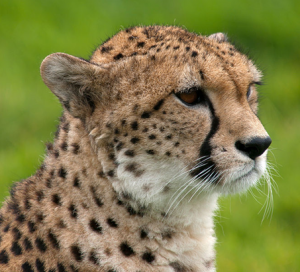News
Latest Lion Aid News
Canine distemper virus, domestic dog vaccination, lions and cheetahs
Wednesday 21st December 2011
|
In a recent article Alienor Cauvenet and co-authors from the Institute of Zoology, London looked at the impact of domestic dog canine distemper vaccination campaigns, the positive impact on lion populations in the Serengeti, and the possibly negative implications on cheetah populations in the same ecosystem. Basically, their conclusions were that the vaccinations and the resulting diminution of canine distemper virus in the ecosystem benefited one species (lions) but had a consequent negative effect on cheetah populations, as the subsequently rebounding lion population had adverse effects on cheetah reproduction. The article was written as a supposed cautionary message against promoting the conservation of one species over another. The article was based on selective use of information, a lack of understanding of introduced diseases on susceptible carnivore populations, and evident unfamiliarity of evolutionary relationships among carnivore species. In short, it is no more than a series of assumptions. But let’s start with a bit of history. In 1994 a canine distemper virus outbreak swept through the Serengeti, killing an estimated one third (1000) of lions in the population. The outbreak also killed lions in the Masai Mara and in the Ngorongoro Crater. The virus was isolated and genetically typed – but then compared to a South African strain in claims that it was a genetic variant of possibly higher virulence. The outbreak, according to authors in the journal Nature (Roelke-Parker at al, 2006), also affected hyenas, bat-eared foxes, and leopards. In the Masai Mara, an earlier outbreak resulted in local extinction of the African Wild Dog population (Alexander et al 1993, J. Zoo Wildl. Med; Alexander & Appel 1994, J. Wildl. Dis; Alexander et al 1995, J. Zoo Wildl. Med), and a subsequent outbreak in the northeastern Serengeti killed more Wild Dogs in 2007 (Goller et al 2007, Vet. Microbiol). The outbreak also likely affected carnivores like jackals (Canis adustus, Canis mesomelas, and Canis aureus) at least. Canine distemper has a very wide host range, extending from Lesser Pandas to raccoons, canids to felids. In response to the 1994 outbreak, Project Life Lion was established to vaccinate domestic dogs in the area, the source and maintenance host population for further epidemics. Was this necessary? I believe so. Canine distemper is an introduced and emerging disease among African carnivores. The virus, like the most prevalent form of rabies in Africa, comes from domestic dogs, a carnivore introduced by humans to sub-Saharan Africa and Tanzania not much more than 500 years ago. After the distemper outbreak with high mortality among lions, subsequent sampling among a number of survivors indicated that 85% had antibodies. In other words, not all infected lions died, another widely observed consequence of canine distemper virus among a diversity of susceptible carnivores. With that level of protective antibodies among survivors, was the vaccination programme necessary among domestic dogs? The answer is again yes, as that maintenance host population will probably spawn repeated epidemics, and apart from lions, very many other carnivores will be affected. Now let’s return to the paper by Cauvenet et al. Their assertion is that the vaccination programme (despite the evidence of protective antibodies among lions) was responsible for a resurgence in lion populations in the Serengeti, much to the disadvantage of sympatric cheetahs. They say that this “unintended” consequence of protecting one species (lions) with a vaccination programme of domestic dogs could lead to the demise of another species (cheetahs) – because lions kill cheetah cubs and adults. Not only do Cauvenet et al ignore the fact that a great number of other species were negatively affected by the distemper outbreak, they also ignore three other important pieces of information. First, lions and cheetahs have probably been interacting negatively on the African savannahs for tens if not hundreds of thousands of years. Lions also cause mortality among other sympatric predators like hyenas, Wild Dogs, and leopards. Lions are apex predators after all, and the composition of the entire predator and prey community is shaped by their presence. Second, tacitly accepting that an unchecked and introduced disease should alter this ancient formula to the benefit of a single species (cheetahs) is nonsensical. And third, their naïve acceptance that cheetahs are not themselves affected by canine distemper is unsubstantiated. For example, studies in Namibia by Munson et al (2004 – J. Wildl. Dis) indicate that 24% of a sample of 81 free-ranging cheetahs in an area of likely contact with domestic dogs had canine distemper antibodies. They say “Antibodies against CDV were detected in cheetahs of all ages sampled between 1995 and 1998, suggesting the occurrence of an epidemic in Namibia during the time when CDV swept through other parts of sub-Saharan Africa. This evidence in free-ranging Namibian cheetahs of exposure to viruses that cause severe disease in captive cheetahs should direct future guidelines for translocations, including quarantine of seropositive cheetahs and preventing contact between cheetahs and domestic pets.” Given the wide host range of canine distemper, it is very likely that cheetahs will also be susceptible, and suffer population consequences of an epidemic. In summary, introduced and emerging diseases among wildlife populations should be actively addressed. Assertions that one species (cheetahs) might benefit from unchecked outbreaks among competitors (lions) are specious. Especially when such outbreaks could affect cheetahs themselves, and also have significant consequences on a great number of other sympatric carnivores. Cauvenet et al’s paper should have been more vigilantly reviewed. Picture: http://en.wikipedia.org/wiki/File:Cheetah_portrait_Whipsnade_Zoo.jpg Tags: lions, cheetahs, Serengeti, Canine Distemper, wildlife diseases, vaccination programmes, Categories: Wildlife Diseases |
Posted by Pieter Kat at 14:45
No comments have been posted yet.
Add a new comment
Existing user
New user sign up




